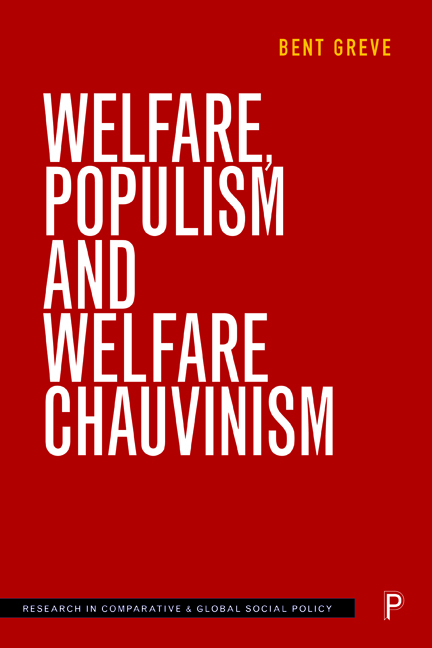Book contents
- Frontmatter
- Contents
- List of tables and figures
- Preface from the series editors
- Preface
- 1 What is it all about?
- 2 Basic concepts
- 3 Why inequality matters
- 4 Dualisation and the labour market
- 5 What form has the development in welfare spending taken?
- 6 Has social cohesion been eroded?
- 7 What do we know about citizens’ perception of the welfare state?
- 8 Populism, welfare chauvinism and hostility towards immigrants
- 9 Concluding remarks
- Index
2 - Basic concepts
Published online by Cambridge University Press: 27 April 2022
- Frontmatter
- Contents
- List of tables and figures
- Preface from the series editors
- Preface
- 1 What is it all about?
- 2 Basic concepts
- 3 Why inequality matters
- 4 Dualisation and the labour market
- 5 What form has the development in welfare spending taken?
- 6 Has social cohesion been eroded?
- 7 What do we know about citizens’ perception of the welfare state?
- 8 Populism, welfare chauvinism and hostility towards immigrants
- 9 Concluding remarks
- Index
Summary
Introduction
Voters’ and citizens’ perception of what would be the best way for a welfare state to develop are often analysed using a variety of concepts. These concepts are presented, albeit briefly, as this helps to frame the understanding, analysis and discussion in the book. The basic concepts that are discussed and presented in this chapter are: welfare chauvinism, legitimacy, deserving/undeserving, populism and ideas.
The central reason for choosing these concepts is that several of them are not always used consistently and/or have connotations that implicitly indicate a normative position. Furthermore, they can be used as a way to understand the arguments and reasons for people's positions across welfare states. This is also because these concepts are influential – some for many years – in the understanding of why welfare states have developed as they have. Lastly, one can argue that social policy (and welfare state development) is dependent to a large degree on demand and broad political support (Rehm, 2011).
The chapter starts, in the next section, with what is populism as this is one of the most discussed aspects of societal development in recent years linking ideas and social policy. The core reason for this is that populism and populist ideas are embedded in the development of most welfare states, often even without having been presented as such. This is followed by presenting how ideas, such as populist ideas, can influence societal development. Historically, the legitimacy of welfare states has also been on the agenda and this is probed into in the fourth section, especially as Chapter 7 looks into attitudes towards, and the legitimacy of, the welfare state. Welfare chauvinism is a relatively new concept and might also be considered a populist idea, which also catches many of the different aspects looked at earlier in the chapter. Thereby, it is a useful concept as a way of summing up the possible impact on welfare state development. This is looked at further in the fifth section, before the sixth section concludes the chapter.
- Type
- Chapter
- Information
- Welfare, Populism and Welfare Chauvinism , pp. 17 - 38Publisher: Bristol University PressPrint publication year: 2019



